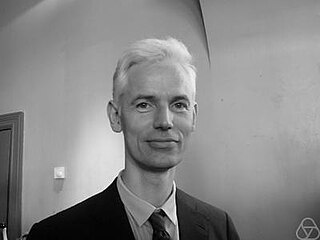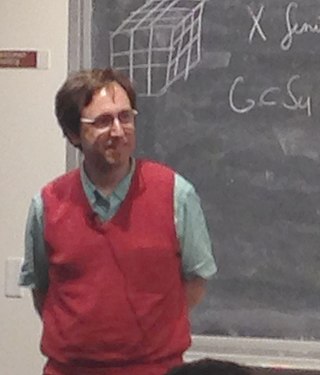
Sir William Timothy Gowers, is a British mathematician. He is Professeur titulaire of the Combinatorics chair at the Collège de France, and director of research at the University of Cambridge and Fellow of Trinity College, Cambridge. In 1998, he received the Fields Medal for research connecting the fields of functional analysis and combinatorics.
In arithmetic combinatorics, Szemerédi's theorem is a result concerning arithmetic progressions in subsets of the integers. In 1936, Erdős and Turán conjectured that every set of integers A with positive natural density contains a k-term arithmetic progression for every k. Endre Szemerédi proved the conjecture in 1975.

Endre Szemerédi is a Hungarian-American mathematician and computer scientist, working in the field of combinatorics and theoretical computer science. He has been the State of New Jersey Professor of computer science at Rutgers University since 1986. He also holds a professor emeritus status at the Alfréd Rényi Institute of Mathematics of the Hungarian Academy of Sciences.

Jean Louis, baron Bourgain was a Belgian mathematician. He was awarded the Fields Medal in 1994 in recognition of his work on several core topics of mathematical analysis such as the geometry of Banach spaces, harmonic analysis, ergodic theory and nonlinear partial differential equations from mathematical physics.

Terence Chi-Shen Tao is an Australian and American mathematician who is a professor of mathematics at the University of California, Los Angeles (UCLA), where he holds the James and Carol Collins Chair in the College of Letters and Sciences. His research includes topics in harmonic analysis, partial differential equations, algebraic combinatorics, arithmetic combinatorics, geometric combinatorics, probability theory, compressed sensing and analytic number theory.

Ben Joseph Green FRS is a British mathematician, specialising in combinatorics and number theory. He is the Waynflete Professor of Pure Mathematics at the University of Oxford.
In additive combinatorics, a discipline within mathematics, Freiman's theorem is a central result which indicates the approximate structure of sets whose sumset is small. It roughly states that if is small, then can be contained in a small generalized arithmetic progression.
Erdős' conjecture on arithmetic progressions, often referred to as the Erdős–Turán conjecture, is a conjecture in arithmetic combinatorics. It states that if the sum of the reciprocals of the members of a set A of positive integers diverges, then A contains arbitrarily long arithmetic progressions.
In mathematics, arithmetic combinatorics is a field in the intersection of number theory, combinatorics, ergodic theory and harmonic analysis.
Additive combinatorics is an area of combinatorics in mathematics. One major area of study in additive combinatorics are inverse problems: given the size of the sumset A + B is small, what can we say about the structures of and ? In the case of the integers, the classical Freiman's theorem provides a partial answer to this question in terms of multi-dimensional arithmetic progressions.

Harald Andrés Helfgott is a Peruvian mathematician working in number theory. Helfgott is a researcher at the CNRS at the Institut Mathématique de Jussieu, Paris. He is best known for submitting a proof, now widely accepted but not yet fully published, of Goldbach's weak conjecture.

Terence John LyonsFLSW is a British mathematician, specialising in stochastic analysis. Lyons, previously the Wallis Professor of Mathematics, is a fellow of St Anne's College, Oxford and a Faculty Fellow at The Alan Turing Institute. He was the director of the Oxford-Man Institute from 2011 to 2015 and the president of the London Mathematical Society from 2013 to 2015. His mathematical contributions have been to probability, harmonic analysis, the numerical analysis of stochastic differential equations, and quantitative finance. In particular he developed what is now known as the theory of rough paths. Together with Patrick Kidger he proved a universal approximation theorem for neural networks of arbitrary depth.
Julia Wolf is a British mathematician specialising in arithmetic combinatorics who was the 2016 winner of the Anne Bennett Prize of the London Mathematical Society. She is currently a professor in the Department of Pure Mathematics and Mathematical Statistics at the University of Cambridge.

In mathematics, and in particular in arithmetic combinatorics, a Salem-Spencer set is a set of numbers no three of which form an arithmetic progression. Salem–Spencer sets are also called 3-AP-free sequences or progression-free sets. They have also been called non-averaging sets, but this term has also been used to denote a set of integers none of which can be obtained as the average of any subset of the other numbers. Salem-Spencer sets are named after Raphaël Salem and Donald C. Spencer, who showed in 1942 that Salem–Spencer sets can have nearly-linear size. However a later theorem of Klaus Roth shows that the size is always less than linear.
The Anne Bennett Prize and Senior Anne Bennett Prize are awards given by the London Mathematical Society.
Roth's theorem on arithmetic progressions is a result in additive combinatorics concerning the existence of arithmetic progressions in subsets of the natural numbers. It was first proven by Klaus Roth in 1953. Roth's theorem is a special case of Szemerédi's theorem for the case .
Thomas F. Bloom is a mathematician, who is a Royal Society University Research Fellow at the University of Oxford. He works in arithmetic combinatorics and analytic number theory.

Sarah Anne Peluse is an American mathematician specializing in arithmetic combinatorics and analytic number theory, and known for her research on generalizations of Szemerédi's theorem on the existence of polynomial progressions in dense sets of integers. She is an assistant professor and LSA Collegiate Fellow in the Department of Mathematics at the University of Michigan.

Ruixiang Zhang is a mathematician specializing in Euclidean harmonic analysis, analytic number theory, geometry and additive combinatorics. He is an assistant professor in the Department of Mathematics at University of California, Berkeley. He and collaborator Shaoming Guo of the University of Wisconsin proved a multivariable generalization of the central conjecture in Vinogradov's mean-value theorem. Zhang was awarded the 2023 SASTRA Ramanujan Prize for his contributions to mathematics.

Julian Sahasrabudhe is a Canadian mathematician who is an assistant professor of mathematics at the University of Cambridge, in their Department of Pure Mathematics and Mathematical Statistics. His research interests are in extremal and probabilistic combinatorics, Ramsey theory, random polynomials and matrices, and combinatorial number theory.











